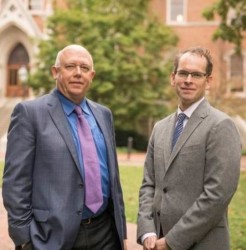[vustarinfo]
As Tennessee looks to elect a new U.S. senator and governor in 2018, new polling figures suggest Republicans in those races may be facing real competition from Democrats, according to the most recent Vanderbilt Poll.
The Vanderbilt Poll is co-directed by John Geer, Gertrude Conaway Vanderbilt Professor of Political Science, and Josh Clinton, Abby and Jon Winkelried Professor of Political Science. Between April 26 and May 8, 2018, the poll surveyed a demographically representative sample of 1,400 registered Tennessee voters on a number of state and national issues. As in previous polls, respondents skewed center-right, with 32 percent identifying as Republicans, 31 percent as independents and 25 percent as Democrats.
The margin of error for the Spring 2018 Vanderbilt Poll is ±3.6 percent.
Senate race heats up
With an overall favorability score of 67 percent, Democrat and former governor Phil Bredesen is more popular among Tennessee voters than his Republican opponent, Congressman Marsha Blackburn, at 49 percent overall.
Both enjoy high support among their respective parties—85 percent of Democrats for Bredesen and 72 percent of Republicans for Blackburn. However, Bredesen is much more popular than Blackburn in other groups. Among independents, he has 69 percent support compared to Blackburn’s 44 percent. He even has a 52 percent favorability rating with Republicans, compared to Blackburn’s 23 percent favorability among Democrats.
“This is a significant lead for Bredesen, but it’s not a lock,” Geer said. “Partisanship could swing voters back in Blackburn’s favor and bring home the GOP base.”
Governor’s race wide open

Name recognition and favorability scores for the six leading gubernatorial candidates suggest that sharp differences among the top Republican candidates, Congressman Diane Black and East Tennessee businessman Randy Boyd, point to potential success for former Nashville mayor Karl Dean, a Democrat.
Black is the most well-known candidate, with 86 percent name recognition, but she has a low overall favorability rating—44 percent—and the highest unfavorability rating of any of her competitors—46 percent. However, her favorability among Republicans is 71 percent. Her favorability among independents is 40 percent, with 52 percent unfavorable.
Boyd’s name recognition has more than doubled to 68 percent since the December poll and he has a much better overall favorability rating than Black—53 percent across the state. He has 66 percent favorability with Republicans and 54 percent favorability with independents.
Though less well-known, Republican candidates Bill Lee (33 percent name recognition) and state Speaker of the House Beth Harwell (53 percent name recognition) are also generally viewed favorably by Republican voters, with Lee closely trailing Boyd at 63 percent favorability and Harwell at 56 percent.
“Diane Black’s unfavorability numbers are a real problem for her in a general election,” said Geer. “Republicans don’t need Democratic votes to win, but they do need votes from independents.”
Dean, the more well-known of the two Democrats, has 47 percent name recognition and a 53 percent overall favorability rating. He’s well-liked by fellow Democrats, with 73 percent favorability, and posts the highest favorability score among independents of all the gubernatorial candidates—60 percent.
The other Democrat in the race, state Rep. Craig Fitzhugh, has 13 percent name recognition and overall favorability of 35 percent. Among Democrats, his favorability score is 55 percent and among independents it’s 29.
None of the gubernatorial candidates were viewed favorably by more than a third of members of the opposing party.
The researchers caution that it’s still too early in the race to lay bets on any of the candidates, however. “Name recognition can rise quickly,” said Clinton. “It will be interesting to see if these favorability numbers change as more people get to know them. Some of these candidates have yet to air many advertisements, so things can change quickly.”
Approval ratings
President Donald Trump saw a boost in his approval ratings, rising five points since December to 53 percent. Meanwhile, Governor Haslam retains the crown as the most popular politician in the state, with a 66 percent approval rating. In line with previous polls, about half the state approves of Senators Alexander (53 percent) and Corker (49 percent). Among legislative bodies, the Tennessee State Legislature has a 56 percent approval rating, while the never-popular U.S. Congress continues to bring up the rear, at 24 percent.
Tennessee voters on the issues
Tennessee voters express clear support for a number of issues, including in-state tuition eligibility for children of undocumented immigrants (65 percent), expanding Medicaid (66 percent), reducing crime by investing more in education and job training (70 percent) and raising pay for public schoolteachers (77 percent).
On gun issues, Tennesseans are divided down the middle. Forty-nine percent support arming teachers while 49 percent oppose it. Fifty percent believe the protests inspired by Parkland students are having a positive effect on the gun debate, while 47 percent believe they’ve been harmful.
For findings on charter schools and vouchers, local sovereignty concerns, the opioid crisis, free trade and more, visit vu.edu/poll.
About the Vanderbilt Poll
The Vanderbilt Poll is supported by the Center for the Study of Democratic Institutions at Vanderbilt University. The statewide poll is typically conducted just before the start of each legislative session and at the end of each session, in part to determine how closely the results of the session align with voters’ expectations and priorities. CSDI also conducts a yearly Nashville poll, as well as additional special polls. In 2015, the Vanderbilt Poll became a charter member of the American Association for Public Opinion Research’s Transparency Initiative.